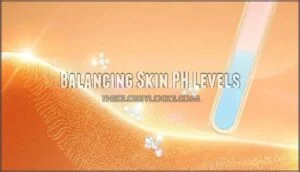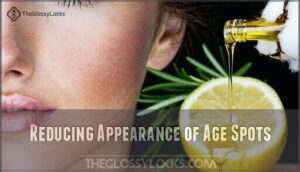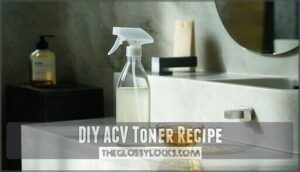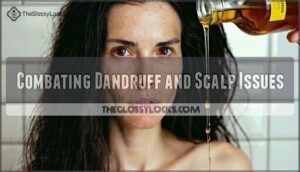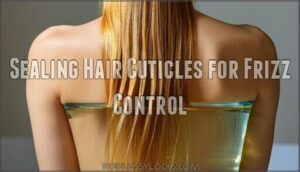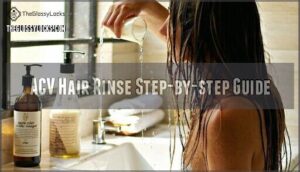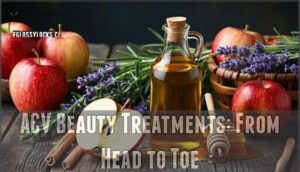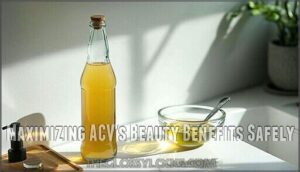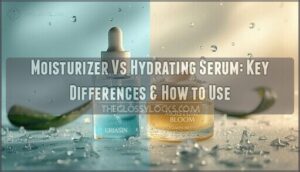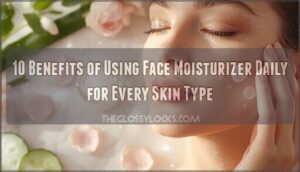This site is supported by our readers. We may earn a commission, at no cost to you, if you purchase through links.

ACV’s acidic properties naturally balance your skin’s pH, tackle stubborn acne, and clarify hair buildup that’s been weighing you down.
It’s like having a Swiss Army knife for your beauty routine – one ingredient that fights dandruff, soothes sunburns, and even helps fade age spots.
The magic lies in its antibacterial and exfoliating powers, but here’s the catch: dilution ratios and timing matter more than you’d think for avoiding irritation while maximizing results.
Table Of Contents
- Key Takeaways
- Apple Cider Vinegar: Nature’s Beauty Elixir
- Transform Your Skin With ACV
- Revitalize Your Hair Using Apple Cider Vinegar
- ACV Beauty Treatments: From Head to Toe
- Maximizing ACV’s Beauty Benefits Safely
- Frequently Asked Questions (FAQs)
- Can I apply apple cider vinegar directly on my face?
- Can apple cider vinegar reduce belly fat?
- How to use apple cider vinegar for skin and hair?
- Is apple cider vinegar good for your hair?
- Can one use cider vinegar for hair rinse?
- How do you use apple cider vinegar on hair?
- Can you use apple cider vinegar for skin?
- What are the benefits of apple cider vinegar?
- Is apple cider vinegar good for acne?
- Is apple cider vinegar good for skin and hair?
- Conclusion
Key Takeaways
- You’ll need proper dilution ratios to avoid skin irritation – mix 1:3 ACV to water for toning, 1:2 for acne treatment, and always patch test first
- You can naturally balance your skin’s pH and fight acne-causing bacteria while gently exfoliating dead cells for a clearer complexion
- You’ll remove stubborn product buildup and combat dandruff by using ACV as a weekly hair rinse that also seals cuticles for frizz control
- You shouldn’t use ACV daily – limit treatments to 1-2 times weekly and start with gentler dilutions to prevent overuse symptoms like burning or flaking
Apple Cider Vinegar: Nature’s Beauty Elixir
You’ve probably walked past apple cider vinegar in the grocery store countless times, never realizing you’re looking at one of nature’s most powerful beauty allies.
This humble pantry staple contains acetic and malic acids that work like gentle chemical exfoliants, plus antioxidants and minerals that can transform your skin and hair routine from ordinary to extraordinary.
Nature’s powerhouse ingredient transforms your beauty routine with gentle acids and antioxidants that actually work.
Chemical Composition and Properties
Apple cider vinegar’s beauty power comes from five key compounds working together. Acetic acid (4-6%) balances your skin’s pH, while malic acid gently exfoliates dead cells. The Mother contains probiotics and enzymes that boost skin health. Rich mineral content includes potassium and magnesium for hydration. These bioactive compounds create nature’s multi-tasking beauty solution.
A popular use involves creating an apple cider vinegar toner for skincare.
- Acetic acid: Restores skin’s natural pH balance
- Malic acid: Provides gentle chemical exfoliation
- The Mother: Delivers beneficial probiotics and enzymes
- Vitamins and minerals: Nourish skin barrier function
- Bioactive compounds: Enhance antioxidant protection
Historical Uses in Beauty Routines
You’ve likely heard of ancient applications for apple cider vinegar, but did you know it’s been a beauty staple for millennia.
Folk medicine traditions embraced ACV’s natural power, while herbal practices incorporated it into traditional skincare routines. From Greek wound treatment to holistic haircare methods, historical uses prove this home remedy’s lasting appeal in natural beauty.
ACV’s effectiveness can be attributed to its natural acidity benefits.
Cultural Tradition Beauty Use of Apple Cider Vinegar
Comparing ACV to Other Natural Beauty Ingredients
When you’re weighing natural beauty ingredients, apple cider vinegar holds its own against popular alternatives.
While honey benefits include gentle moisturizing and coconut oil excels at deep hydration, ACV’s antimicrobial strength reduces acne-causing bacteria by 27%.
Unlike aloe alternative treatments that focus on soothing, ACV actively balances pH levels.
For DIY beauty enthusiasts, it’s more affordable than specialty oils and works better than lemon lightening treatments without the phototoxicity risks that come with citrus-based natural skincare.
Transform Your Skin With ACV
Your skin craves balance, and apple cider vinegar delivers exactly what it needs to look its best.
With its natural acids and pH-balancing powers, ACV tackles everything from stubborn breakouts to dull complexions, giving you that healthy glow you’ve been after.
Balancing Skin PH Levels
Your skin’s pH balance is the secret to a radiant complexion, and apple cider vinegar can help restore it naturally.
Unlock your skin’s natural glow with apple cider vinegar’s pH-balancing magic.
Healthy skin maintains a slightly acidic environment that protects against microbial growth and maintains your skin barrier.
When you use alkaline cosmetics or harsh cleansers, you’re disrupting this delicate balance, leaving your skin vulnerable and irritated.
- Restore your acid mantle with diluted ACV to strengthen your skin’s natural defenses
- Combat alkaline cosmetics damage by using ACV as a gentle, pH-balancing toner after cleansing
- Support eczema relief through careful pH restoration that calms inflammation and irritation
Fighting Acne and Blemishes
You’re dealing with stubborn breakouts? ACV’s got your back. Its antimicrobial power tackles acne bacteria head-on, while natural acids provide gentle pore sanitization. The acetic acid reduces oil production and controls inflammation, making it an effective blemish treatment.
For spot acne treatment, mix one part ACV with two parts water. This dilution fights bacteria without irritating sensitive skin. As a facial toner, try a 1:3 ratio for overall skin clarity.
ACV Solution Usage Benefits
Reducing Appearance of Age Spots
Your age spots don’t stand a chance against apple cider vinegar’s powerful arsenal. The malic acid naturally exfoliates dead skin cells while promoting healthy melanocyte function for reduced hyperpigmentation.
This gentle yet effective approach targets melanin production at its source.
- Mix ACV with lemon juice for enhanced skin lightening effects
- Create a clarifying rinse to remove buildup while treating spots
- Apply diluted solution nightly for gradual hyperpigmentation reduction
Soothing Sunburns and Skin Irritations
When sunburn strikes, you’ll want ACV dilution (1 part vinegar to 3 parts cool water) for instant cooling effects.
Pat this skin soother gently on irritated areas using a soft cloth. The antiinflammatory properties promote healing while reducing itch relief naturally.
For widespread sunburn relief, add one cup to your bath for full-body inflammation reduction. It can also balance skin’s pH with consistent use to achieve natural healing.
DIY ACV Toner Recipe
Create your own skin toner with this simple ACV dilution recipe.
Mix 1 part organic apple cider vinegar with 2-4 parts filtered water, depending on your skin’s sensitivity. Always patch testing first!
Store your homemade skin toner in a spray bottle for easy application methods. This beauty hack delivers apple cider vinegar benefits while maintaining proper toner storage for lasting freshness.
You can also find toner making supplies online.
Revitalize Your Hair Using Apple Cider Vinegar
Your hair deserves the same natural care you give your skin, and apple cider vinegar delivers exactly that with its clarifying and pH-balancing properties.
Whether you’re dealing with stubborn product buildup, annoying dandruff, or frizzy hair that won’t cooperate, ACV works like a gentle reset button for your scalp and strands.
Clarifying and Removing Product Buildup
Your hair’s been through a lot—styling products, dry shampoo, and oils can create a sticky mess that regular shampoo can’t tackle. ACV for hair works like a reset button, dissolving stubborn product buildup with its acidic properties. This clarifying rinse leaves your scalp feeling fresh and your strands bouncing with life again.
- Scalp Detox: ACV’s acetic acid breaks down waxy residues that clog follicles and weigh hair down
- Buildup Causes: Heat protectants, gels, and even hard water minerals accumulate over time, dulling your hair’s natural shine enhancement
- Rinse Frequency: Use this hair clarification method once weekly to avoid over-stripping natural oils
- ACV Alternatives: Baking soda or clarifying shampoos work, but ACV’s gentler approach preserves your hair’s moisture balance
Combating Dandruff and Scalp Issues
Beyond removing buildup, ACV tackles dandruff by controlling Malassezia fungus that causes flakes.
Its antifungal properties restore healthy scalp pH, providing itch relief and exfoliation benefits.
Mix one tablespoon ACV with four parts water for ideal ACV dosage.
This weekly rinse reduces flakes by 48% while soothing irritation naturally, promoting better scalp health without harsh chemicals.
Sealing Hair Cuticles for Frizz Control
Frizzy hair driving you crazy? ACV’s acidity naturally flattens hair cuticles, locking in moisture and creating that glossy, smooth finish you’ve been chasing.
The right ACV concentration matters – too strong damages hair porosity, too weak won’t seal properly. Apple cider vinegar can also balance hair pH for scalp health.
Here’s how different hair types benefit:
- Fine hair – Use lower ACV concentration for gentle frizz control without weighing down strands
- Thick hair – Higher concentrations work better, but adjust rinse frequency to prevent over-processing
- Damaged hair – Start with diluted solutions; long-term effects include improved hair shine and manageability
ACV Hair Rinse Step-by-step Guide
Transform your locks into lustrous strands with this simple ACV hair rinse that’ll leave your hair looking salon-fresh.
Basic ACV Hair Rinse Recipe:
| Ingredient | Amount |
|---|---|
| Apple cider vinegar | 2 tablespoons |
| Purified water | 16 oz |
| Application time | 2-3 minutes |
Mix your dilution ratios in the shower, then apply using gentle application techniques from roots to ends after shampooing.
You can find a variety of ACV hair rinse products online.
The rinse frequency depends on your hair types—oily hair benefits from weekly use, while dry hair needs it less often.
Expected results include enhanced hair shine and healthier hair growth. Cool water seals the deal, locking in those hair care benefits for gorgeous, healthy hair.
ACV Beauty Treatments: From Head to Toe
You’ve already discovered ACV’s incredible benefits for your face and hair, but this powerhouse ingredient can work wonders for your entire body.
From softening stubborn calluses to strengthening weak nails, apple cider vinegar offers simple solutions for common beauty concerns from head to toe, utilizing its properties to enhance overall well-being with powerhouse ingredients.
Softening Rough Feet and Calluses
Your tired feet deserve some TLC! Create ACV foot soaks by mixing one part apple cider vinegar with four parts warm water.
Soak for 20 minutes to soften calluses naturally. The acetic acid breaks down tough skin, making removal easier.
For stubborn spots, try overnight ACV wraps with cotton pads. Follow up with ACV with pumice gentle scrubbing, then moisturizing after ACV for baby-soft results.
Strengthening Brittle Nails
Brittle nails driving you crazy? This ACV soak works wonders for nail health. Here’s your game plan:
- Mix equal parts ACV and water for proper nail hydration
- Soak nails 10-15 minutes while massaging cuticles for cuticle care
- Repeat weekly alongside proper filing technique for stronger nails
This natural nail brightening treatment also helps prevent nail fungus treatment needs. Many people use this ACV nail soak for added benefits.
Remember, dietary impact matters too—pair this nail polisher alternative with biotin-rich foods for maximum results.
Soothing Razor Burn and Ingrown Hairs
Razor burn and ingrown hairs don’t stand a chance against apple cider vinegar’s antimicrobial properties.
Create a razor burn relief solution by mixing equal parts ACV and water, then gently dab onto affected areas.
This ingrown hair treatment helps restore skin pH balance, reduces redness, and provides skin soothing benefits.
The natural bump prevention formula calms irritation while promoting healing.
Brightening Teeth and Freshening Breath
Your smile deserves nature’s gentle touch for teeth whitening and breath freshening. Apple cider vinegar’s antimicrobial properties naturally combat odor-causing bacteria while its mild acetic acid helps dissolve surface stains for brighter teeth.
Natural oral care benefits:
- Mix 1 teaspoon ACV with 8 ounces water for homemade mouthwash
- Gargle 10-15 seconds weekly to reduce plaque-forming bacteria
- Combine with baking soda for gentle tooth whitening paste
- Rinse with plain water afterward to protect enamel
- Use diluted solution to prevent gum irritation and maintain oral health
ACV Bath Soak for Full-body Benefits
Transform your entire body with a luxurious detoxifying treat that delivers skin renewal and muscle relief.
Add 1-2 cups organic ACV to warm bathwater, creating a full body exfoliation experience that softens skin naturally.
This ACV for skin ritual promotes detoxification and skin rejuvenation while providing deep relaxation techniques for stress relief and enhanced well-being.
Using an apple cider vinegar body wrap can also enhance the benefits of this treatment.
Maximizing ACV’s Beauty Benefits Safely
While apple cider vinegar offers impressive beauty benefits, you’ll need to use it correctly to avoid turning your skin into a science experiment gone wrong.
Getting the dilution ratios right and knowing when to stop isn’t just smart—it’s essential for keeping your skin happy and healthy.
Proper Dilution Ratios for Different Uses
Getting dilution ratios right makes all the difference between gorgeous skin and an irritated mess.
For skin toning, start with 1:3 (one part ACV to three parts water) for pH balancing. Acne treatment can handle slightly stronger 1:2 dilution ratios, while sensitive skin needs gentler 1:4.
Hair clarifying works best at 1:5 for safe pHfriendly results.
Always patch test your ACV for skin mixture first—these natural remedies pack serious punch when dilution goes wrong.
ACV is also valued for its antimicrobial and astringent properties.
Frequency of Use for Optimal Results
Once you’ve nailed proper dilution ratios, timing becomes your next game-changer.
Here’s your roadmap to ACV success without the ouch factor:
- Weekly Regimen: Start with 1-2 times per week, not daily use like some beauty gurus suggest
- Patch Testing: Always test on a small skin area first, waiting 24 hours for any irritation signs
- Sensitive Skin: Limit frequency of use to once weekly, watching for redness or burning sensations
- Overuse Symptoms: Stop immediately if you notice persistent stinging, flaking, or increased breakouts
Less really is more with this potent beauty ingredient.
Potential Side Effects and Precautions
While ACV can work wonders for your beauty routine, it’s not all sunshine and rainbows.
Up to 20% of users experience skin irritation when using undiluted ACV, so understanding potential side effects helps you stay safe while reaping the benefits.
Here are key precautions to follow:
- Always perform a patch test – Apply diluted ACV to a small skin area and wait 24 hours to check for allergic reactions or irritation signs like redness or swelling.
- Never skip proper dilution – Undiluted ACV can cause chemical burns, especially on sensitive skin.
- Watch for overuse risks – Limit treatments to once weekly for normal skin, less for sensitive types, to prevent over-exfoliation and hair breakage.
- Recognize your skin sensitivity – Children, pregnant women, and those with eczema face higher risks and should consult healthcare providers before use.
Use at least a 1:4 dilution ratio with water.
Combining ACV With Other Natural Ingredients
Boost ACV’s power by mixing it with natural ingredients.
Honey and ACV create antibacterial face masks, while ACV and herbs like chamomile soothe irritation.
Oils and ACV combinations work great—tea tree fights acne, lavender calms skin.
ACV and yogurt provide gentle exfoliation.
Baking soda neutralizes acidity for sensitive skin.
These DIY recipes maximize your beauty hacks.
Storing and Preserving ACV Beauty Solutions
Your ACV beauty solutions’ shelf life depends on proper storage techniques. Always choose glass containers over plastic since they won’t react with acidic solutions. Keep your homemade mixtures away from light exposure and maintain temperature control in cool, dark spaces.
Here are five essential storage tips:
- Use glass containers only – plastic can leach chemicals into acidic solutions
- Store in refrigerator – extends shelf life up to one week for homemade blends
- Watch for expiration indicators – discard if you notice mold, cloudiness, or off smells
- Label with dates – homemade vs. commercial products have different lifespans
- Mix fresh when possible – prepare small batches to maintain potency and safety
Frequently Asked Questions (FAQs)
Can I apply apple cider vinegar directly on my face?
Like tossing raw chili on tender skin, pure apple cider vinegar burns without dilution.
You’ll need to mix one tablespoon with two cups water first, then patch test before applying to avoid irritation.
Can apple cider vinegar reduce belly fat?
You’ll find research supporting apple cider vinegar‘s modest weight loss benefits. Studies show 1-2 tablespoons daily may help reduce belly fat when combined with healthy diet and exercise habits.
How to use apple cider vinegar for skin and hair?
Despite concerns about harsh acids, diluted apple cider vinegar works wonders for both skin and hair.
Mix one tablespoon with water, use as toner or rinse after shampooing, then rinse thoroughly.
Is apple cider vinegar good for your hair?
Yes, apple cider vinegar can benefit your hair.
It clarifies buildup, fights dandruff with antimicrobial properties, balances scalp pH, and seals cuticles for added shine and reduced frizz when properly diluted.
Can one use cider vinegar for hair rinse?
You can definitely use apple cider vinegar as a hair rinse.
Mix one part ACV with three parts water, apply after shampooing, then rinse out.
It’ll clarify buildup and add shine.
How do you use apple cider vinegar on hair?
Apple cider vinegar’s antimicrobial properties aren’t just folklore—they’re scientifically backed.
Mix one part ACV with three parts water, pour over freshly shampooed hair, let it sit two minutes, then rinse thoroughly for clarified, shiny strands.
Can you use apple cider vinegar for skin?
You can definitely use apple cider vinegar on skin as a natural toner and cleanser.
Its acids gently exfoliate, balance pH, and fight acne-causing bacteria.
Always dilute it first though – straight vinegar will irritate your skin like nobody’s business.
What are the benefits of apple cider vinegar?
Think you’ve found the fountain of youth in your pantry?
Apple cider vinegar does pack some punch—it balances skin pH, fights acne-causing bacteria, gently exfoliates dead cells, and clarifies hair by removing buildup for shinier locks.
Is apple cider vinegar good for acne?
ACV’s antimicrobial properties can help fight acne-causing bacteria and reduce inflammation, but you’ll need proper dilution to avoid irritation. It’s less effective than proven treatments like salicylic acid.
Is apple cider vinegar good for skin and hair?
Who knew the kitchen pantry could double as your beauty cabinet?
You’re in luck—apple cider vinegar works wonders for both skin and hair, balancing pH, fighting bacteria, and gently exfoliating while clarifying buildup.
Conclusion
Like Cleopatra’s legendary beauty secrets, today’s smart approach to beauty uses of apple cider vinegar for skin and hair delivers real results when done right.
You’ve got the knowledge to transform your routine with this powerhouse ingredient. Remember, dilution is your best friend, and consistency beats intensity every time.
Start small, listen to your skin, and watch ACV work its magic. Your mirror will thank you for this natural glow-up.
- https://www.mvsu.edu/sites/default/files/webform/the-history-of-apple-cider-vinegar-as-a-health-remedy-nz10tq.html
- https://blogs.gwu.edu/kh605/2025/08/23/en-apple-cider-vinegar-a-natural-remedy-for-better-health/
- https://107beauty.com/blogs/107-secrets/did-cleopatra-really-use-vinegar-for-skin-care
- https://avalah.com/blogs/news/unlocking-beauty-the-transformative-power-of-apple-cider-vinegar
- https://swbasics.com/blogs/how-to-everything/unlocking-the-benefits-of-apple-cider-vinegar-in-skincare-the-sw-basics-toner

